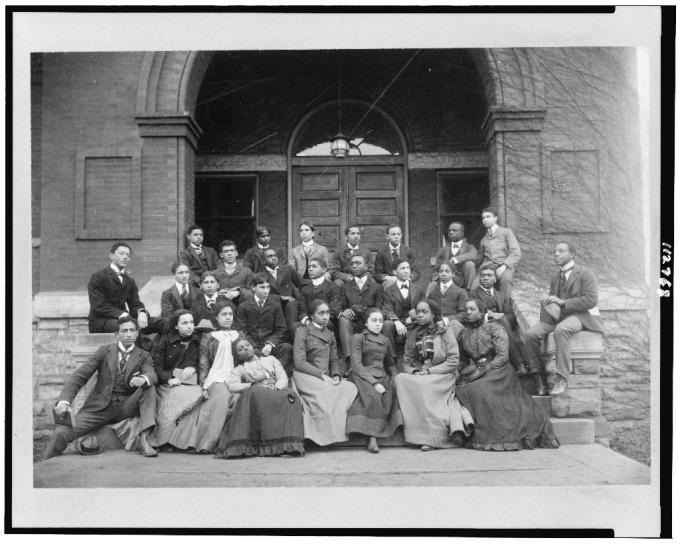Prior to the Civil War, slavery was a vital, thriving economic mainstay in Tennessee, and Nashville was no exception. In 1860 there were over 275,000 enslaved peoples living in Nashville. The average value of an enslaved person was about $800, so the value of the capital represented by enslaved peoples was around $220 million. In today’s money, that would be about $6.8 billion. As a point of reference for scale, the entire Tourism industry in the Nashville metro area represents about $7 billion of economic impact annually. The music industry represents $10 billion. The institution of slavery was sanctioned and enforced by the government, with the city owning 60 slaves prior to the Civil War. Those enslaved by the city of Nashville actually built the city’s first successful water system. While the city’s enslaved population represented a highly skilled labor force, their collective success as a free populace would also require traditional education. In steps Fisk University to fill the void.
Since the first enslaved peoples arrived in 1619, there were various religious organizations committed to the abolition of slavery and the education of Blacks in this country. Two prominent organizations were the American Home Missionary Society and the American Board of Commissioners for Foreign Missions. These organizations were not without issue, as they were often presented with the dilemma of upholding the ideals of equality versus expanding their Christian footprint through evangelism. Many members of both groups became frustrated over the organizations’ increasingly tepid stance on slavery, wherein they would appear to denounce the institution while accepting membership and financial contributions from the slaveholding elite. The discontented members eventually split and formed the American Missionary Association. The AMA would eventually establish 11 HBCUs and would expend more financial resources than the Freedmen’s Bureau of the federal government. So, it was in 1865 that AMA members John Ogden, Erasmus Milo Cravath, and Edward Parmelee Smith founded the Fisk Free Colored School in Nashville. The school was named after General Clinton B. Fisk, Chief of the Freedmen’s Bureau of Tennessee, who donated a Union Army barracks for the school’s use and contributed $30,000 toward the school’s endowment. The first students ranged in age from 7 to about 70 years old, and enrollment surged to almost 900 students within the first few months of opening. The ambitions of the founders were further realized when the school was incorporated as Fisk University by 1867.

Since its founding, Fisk has forged some of the most notable names in the history of America, ranging from the arts to mathematics. W.E.B. Du Bois, one of America’s foremost Black intellectuals, was a proud graduate of Fisk. Fisk alumna Dr. Jedediah Isler became the first Black woman to receive a Ph.D. in Astrophysics from Yale and is currently a Professor of Astrophysics at Dartmouth. Fisk has made its mark on the highest offices in the land, a fact exemplified by Hazel O’Leary’s appointment as Secretary of Energy under the Clinton administration. All mathematicians owe a debt of gratitude to Fisk alumna and former Spelman Mathematics Chair, Dr. Etta Falconer, as one of the first Black women to receive a Ph.D. in Mathematics. Nikki Giovanni transformed the literary landscape forever after graduating from Fisk. Graduates of Fisk can be found in every facet of society.
Fisk enrolls approximately 800 students, yet their graduates have an outsized impact on society. Fisk has a distinguished reputation for employing dedicated professors who uphold exacting standards for academic rigor and moral fortitude. Many of the professors were themselves HBCU graduates, and pride in their legacy compels them to demand excellence from their students. Such a requirement from professors, however, is not informal or self-serving. An unmatched passion for their field of study and a genuine love for their students fuel their unmitigated and relentless methods. Professors, through love, inspire students to establish standards that they may have previously thought unattainable. At Fisk, a student’s self-image is reimagined and fortified to the extent that unlikely dreams become routine accomplishments. Excellence is in the Fisk DNA, and we would all do well to acknowledge and model it.
There are almost no words to adequately describe how special HBCU’s are. Alumni recognize that. It is my hope to highlight the magic that is HBCU’s so as to increase alumni giving, enrollment, and external financial investment. For more information on ways to contribute, please visit
